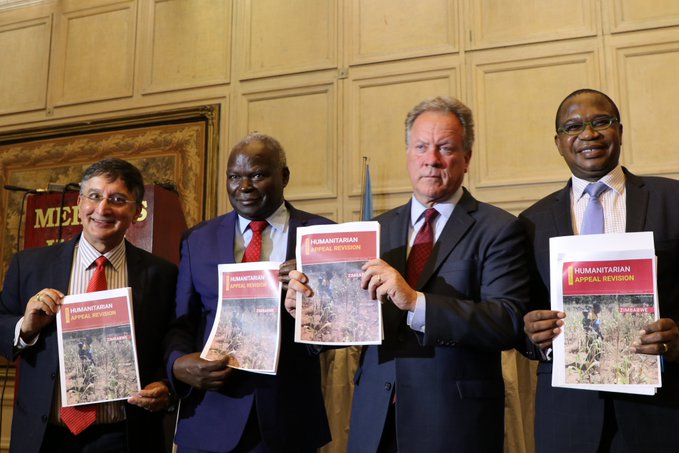With new evidence of increasing vulnerabilities in Zimbabwe as a result of climate and economic shocks, the Government, the United Nations and the humanitarian partners felt the urgency to revise the appeal to cover the multi-sectoral humanitarian needs of the most vulnerable communities up to April 2020.
UN Resident Coordinator, Ambassador Bishow Parajuli made the remarks during the launch of Zimbabwe’s Revised Humanitarian Appeal in Harare on Tuesday 6 August 2019.
“The revised appeal was developed in close coordination with the Government’s Cabinet Committee on Environment, Disaster Prevention and Management, chaired by Hon. Minister July Moyo. It takes into account the Government strategy and plans for addressing the increasing humanitarian needs. The humanitarian interventions in the revised appeal are meant to address the gaps in the Government efforts, focusing on priority life-saving support targeting the people most in need,” Ambassador Parajuli said.
The 2019 Zimbabwe Vulnerability Assessment Committee (ZimVAC) Rural Livelihoods Assessment estimates that 5.5 million people in the rural areas are food insecure. Of this population, the Integrated Food Security Phase Classification (IPC) analysis points to over 3 million people – or 38% of the rural population – projected to be in need of urgent humanitarian support between the period October to December 2019.
“Recognising that the urban communities are most market reliant and susceptible to affordability issues, the Ministry of Public Service, Labour and Social Welfare estimates that up to 2.2 million people in urban areas are food insecure. An urban vulnerability assessment is currently ongoing, whose findings and recommendations will further inform urban humanitarian actions,” Parajuli said.
Mr. David Beasly, the Executive Director of the World Food Programme who was Guest of Honour at the event commended the resilience shown by Zimbabweans despite the humanitarian challenges and underscored that the communities had a brighter hope for the future. He said the multi-stakeholder collaborations among Government, the UN and development partners and the private sector will go a long way in providing support to the people.
In his overview of the situation, Ambassador Parajuli said Cyclone Idai, which struck the eastern part of the country in March this year, affected 270,000 people and left 50,000 people displaced. He noted that while significant efforts have been undertaken to respond to the impact of the cyclone, some of the affected households still require humanitarian assistance, particularly the internally displaced persons in temporary sites, those living with host families and those who lost everything.
“The early recovery, recovery and resilience building needs of the cyclone-affected communities have been identified and are being addressed by the Government and partners, including through support from the World Bank and the African Development Bank. The Early Recovery Sector – led by UNDP – developed a multi-sectoral Early Recovery Plan – for a total of USD 69 million – in support Government efforts. The plan emphasizes a shift from saving lives to restoring livelihoods as well as addressing the root causes of vulnerabilities and strengthening disaster risk management in Zimbabwe.”
He added that under the last Flash Appeal that covered the period January to June 2019, the partners have contributed over USD 133 million or 45.5 percent of the priority humanitarian needs of both the drought- and cyclone-affected communities, reaching over two million women, men and children with critical and life-saving interventions. Close to 1.2 million people received food assistance; 400,000 people received clean water and safe sanitation; 600,000 people received essential health services; and, 16,000 girls and boys received child protection services.
“The revised appeal targets the multi-sectoral humanitarian needs of 3.7 million vulnerable people, out of the 5.1 million people whom we have identified as in need of humanitarian assistance. The total requirement to address the humanitarian needs of these 3.7 million people by the international humanitarian community between the period July 2019 to April 2020 is approximately USD 331.5 million.”
United States Ambassador Brian A. Nichols underscored the fact that since the American people stand with the people of Zimbabwe his government pledged to provide an additional 45 million U.S. Dollars to respond to the increased emergency food needs.
“With these resources, the United States is giving life-saving food assistance for 360,880 vulnerable Zimbabweans. Through USAID, we are proud to work with the World Food Programme to deliver this assistance to the communities and people who need it most. Our 45 million U.S. Dollar contribution will provide food rations and cash transfers for the purchase of food, alleviating hunger and suffering for those affected by food insecurity.
“Our hand of friendship remains extended to the government and people of Zimbabwe. We are proud to be part of a coordinated response to the humanitarian situation. We work closely with the UN and other donors to ensure that as many communities as possible are covered during this challenging time,” Ambassador Nichols said.
The US Ambassador said the agricultural sector in Zimbabwe has incredible potential to revive the economy.
“It cannot be further jeopardised by corruption and mismanagement of resources. We support Zimbabwe’s renewed efforts to tackle corruption, which along with political reforms, will increase growth and investment. In order to end the cycle of privation in a country that was once the bread basket of Africa, Zimbabwe should accelerate market based-policies that make land bankable, fully liberalise the trade of grains and pulses, pay local farmers on par with imported grain costs, put idle farmland on the market, speed resolution of claims owed to commercial farmers, and end the Vulnerable Inputs Support Scheme in favour of more transparent support to small holder farmers.”
The United States remains the largest bilateral donor to emergency humanitarian assistance in Zimbabwe. The American people support programs that educate Zimbabwean small holder farmers on how to increase productivity, use less water, and deploy fewer inputs.






